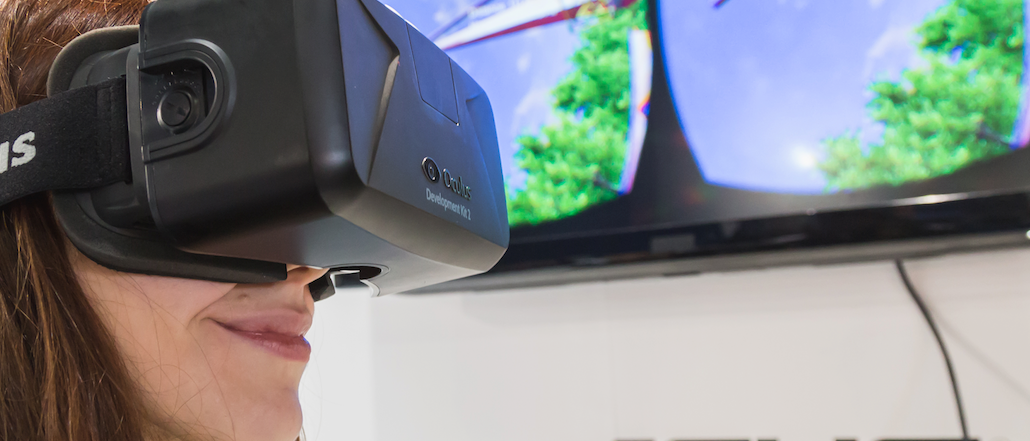
Facebook has started showing advertisers how Oculus Rift virtual reality goggles will fit into their marketing, and it’s talking more about 360-degree video as a way to experiment with immersive experiences, according to agency sources.
The social network, which bought the VR company last year for $2 billion, has taken its time developing the goggles, and is even more deliberate about discussing the advertising applications of the platform. Oculus is expected to start selling to the general public early next year, and Facebook admits it will take time for such headgear to become household staples.
Facebook is not expected to develop traditional, interrupting ads in Oculus, but brands want to sponsor special content in the virtual world, and undoubtedly work in product placements.
Now, Facebook is helping them think about the possibilities, sources said, trotting it out for its “wow” factor.
“They’re finally getting around to getting to what Oculus means in the grand scheme,” said one creative agency executive, who has discussed virtual reality with Facebook reps. “It’s come up in pitch situations where they say they want us to use it for big brand launches.”
Facebook is telling brands to think more about how Oculus provides the infrastructure for them to create 360-degree videos, which has more immediate potential for mass distribution, the source said.
They have discussed the potential for shooting live 360-degree videos at events, which play in the Facebook News Feed, the source said. Facebook is talking about marketing avenues that could open by the second quarter 2016, the source said. Facebook declined to comment for this article.
Oculus is not the first virtual reality headwear, and rivals like Samsung and Sony have their own. Google has Cardboard, which is basically a box that holds a phone in front of your eyes.
CEO Mark Zuckerberg has said he envisions the technology will catch on similar to how smartphones took off, with a slow roll and then ubiquity. The early adopters, however, are likely to be from the gaming industry.
Publishers and brands already have dabbled in VR. The New York Times, for instance, just launched virtual programming.
Since it could be some time before the masses adopt Oculus-style goggles, many brands are laying the groundwork for the creative potential by shooting 360-degree video, a format that Facebook recently launched in the News Feed.
“As we talk about VR experiences, we make sure to think about 360 experiences on Facebook and YouTube,” said a digital marketing vp at a top entertainment brand. “That is where the real reach would be for this content.”
Facebook also has been discussing the potential for live streams of 360 degree video, sources said. That would combine elements of two of Facebook’s latest technological toys.
Just last week, it started allowing live video streams in the News Feed, and last month, brands like Disney began posting 360-degree videos. Disney created a 360 video to promote Star Wars on Facebook.
For now, standard live video is open to users and high-profile personalities but will likely become available to businesses and brands on their pages. This week, Facebook said 50,000 businesses run pages on the network.
The Wall Street Journal has reported that Facebook is developing an app strictly dedicated to 360-degree video.
It’s not hard to see how live events would benefit from offering people 360-degree views, and it’s already close to a reality. Top Facebook publisher Moviepilot is experimenting with capturing red-carpet events with 360 video, though the live capability is not there yet. MTV already did a 360-degree live stream, not on Facebook, for the Video Music Awards in August.
The possibilities open up more if Facebook develops a TV app, the creative exec said, because there’s less friction than on mobile platforms where you need the headset to really get it.
“Apple TV already has a remote with a gyrometer built into it so you can look up down, left right,” the source said. “You could use virtual reality as conduit for immersive experiences on set-tops.”
More in Media

In Graphic Detail: The scale of the challenge facing publishers, politicians eager to damage Google’s adland dominance
Last year was a blowout ad revenue year for Google, despite challenges from several quarters.

Why Walmart is basically a tech company now
The retail giant joined the Nasdaq exchange, also home to technology companies like Amazon, in December.

The Athletic invests in live blogs, video to insulate sports coverage from AI scraping
As the Super Bowl and Winter Olympics collide, The Athletic is leaning into live blogs and video to keeps fans locked in, and AI bots at bay.





